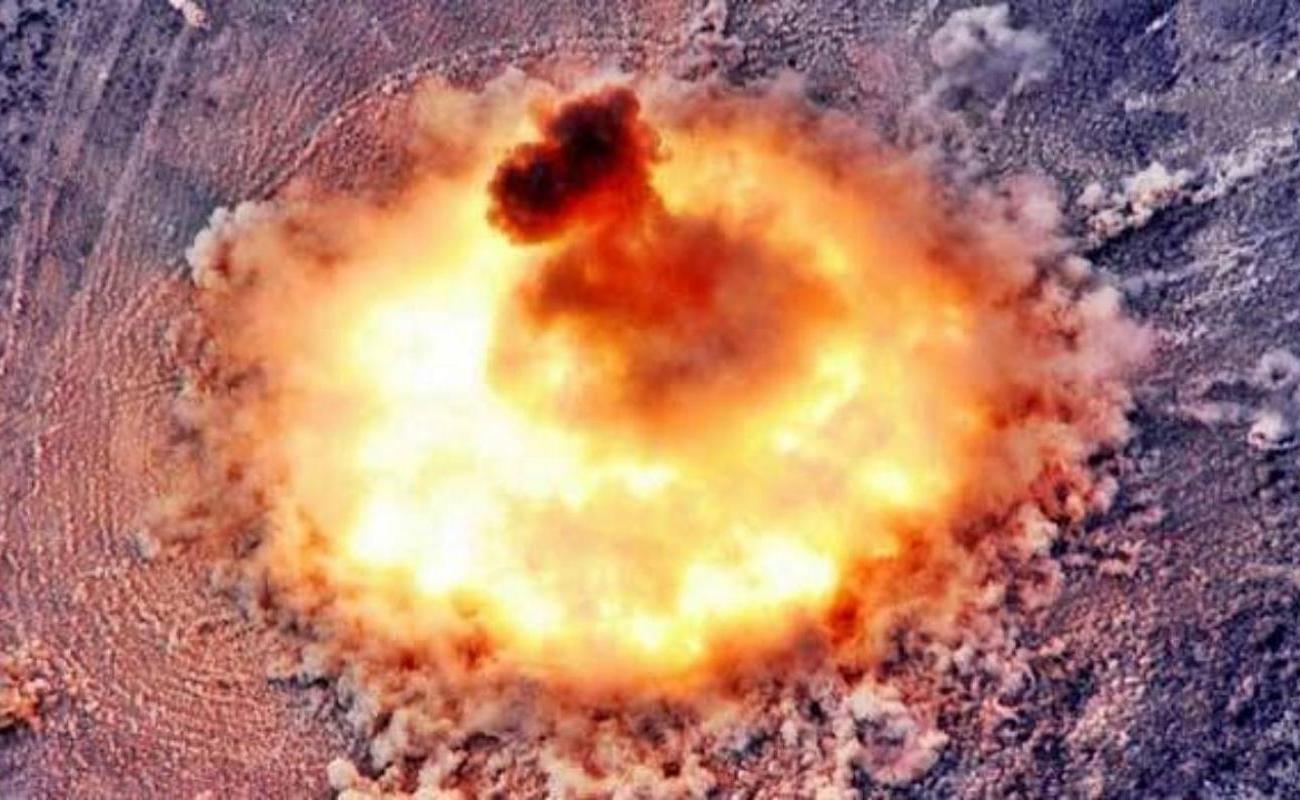Ukraine's ambassador to US says Russia used a vacuum bomb, international groups say banned cluster munitions used to strike shelter
Russia has been accused of attacking Ukrainians with cluster bombs and vacuum bombs, weapons that have been condemned by a variety of international organisations.

Amnesty International and Human Rights Watch both said that Russian forces appeared to have used widely banned cluster munitions, with Amnesty accusing them of attacking a preschool in north-eastern Ukraine while civilians took shelter inside.
Oksana Markarova, Ukraine's ambassador to the United States, told reporters after meeting with members of the US Congress that Russia had used a thermobaric weapon, known as a vacuum bomb, in its invasion of her country.
"They used the vacuum bomb today," Ms Markarova said.
A vacuum bomb uses oxygen from the surrounding air to generate a high-temperature explosion, producing a lethal shock wave and sucking the oxygen from the lungs of anyone in the vicinity.
The bombs, also known as thermobaric warheads, typically produce a blast wave of a significantly longer duration than that of a conventional explosive and are capable of vaporising human bodies.
There has been no official confirmation that thermobaric weapons have been used in the conflict in Ukraine.
Ms Markarova said Ukraine was working actively with the US to obtain more weapons and tougher sanctions.
"They [Russia] should pay, they should pay a heavy price," she said.
Democratic Representative Brad Sherman, who was in the meeting, said the Ukrainians had asked for a US-enforced no-fly zone over Ukraine, but he felt that was too dangerous because it could provoke conflict with Russia.
Vacuum bombs not new
For days there have been reports that Russian TOS-1 rocket launchers had mobilised in eastern Ukraine and had been seen near the city of Kharkiv.
They are able to launch up to 30 rockets armed with vacuum bombs.
CNN reported that one of its teams had spotted a Russian thermobaric multiple rocket launcher near the Ukrainian border early on Saturday afternoon.
White House Press Secretary Jen Psaki said she had seen reports but did not have confirmation that Russia had used such weapons.
"If that were true, it would potentially be a war crime," she told a press briefing, noting that there were international organisations that would assess that and President Joe Biden's administration "would look to be a part of that conversation".
Smaller thermobaric weapons can also be used in close combat fighting, while larger versions can be deployed from attack aircraft.
These kinds of weapons have been around for a while: American forces used thermobaric weapons in Vietnam, and they were also used in Afghanistan to attack the mountainous Tora Bora region.
Russian forces deployed them in the Chechnya conflict more than two decades ago.
When can vacuum bombs be used?
Unlike cluster munitions, vacuum bombs are not prohibited weapons under international law.
But their lawful deployment depends on what they are used to attack, international law expert Professor Ben Saul from the University of Sydney told the ABC.
"If, for example, they were used in a densely populated urban area where you knew there were likely to be civilians, the shock wave or blast effects of the weapon were sufficiently extensive that they would hit those civilians, then that would be unlawful and that would be a war crime," he said.
"The other rule, which would be particularly relevant, is a rule against launching indiscriminate attacks which means attacks … likely to strike military and civilian targets alike in the same place."
Professor Saul said there were situations where attacking targets with vacuum bombs would be "clearly lawful".
"If you were using them in open countryside, against a formation of Ukrainian armoured vehicles or tanks and there are clearly no civilians [about], that would absolutely be a lawful use of the weapon," he said.
"If you've got enemy soldiers or emplacements underground in tunnels or bunkers, using weapons like that is one way of destroying those structures through blast and depriving them of oxygen.
"A simple kinetic attack with conventional explosive will just not do the same job."
Because of the way in which vacuum bombs kill people, there would likely be a move towards banning them, Professor Saul believes.
"Of course, all weapons are awful, but at least with a bullet or fragmentation, like explosives, at least you've got a shot at treating it medically," he said.
"Whereas the kind of organ damage you see from these weapons are just so horrific and it makes medical treatment very difficult."
Cluster bombs kills sheltering civilians
Since invading, Russian forces have targeted schools in four attacks, including using a cluster bomb to strike a preschool where civilians were hiding, according to Amnesty International.
Three people, including a child, were killed in the attack on the town of Okhtyrka, in north-east Ukraine.
Amnesty cited drone footage of the scene that "shows that cluster munitions struck at least seven locations on or near the building, four on the roof and three on the pavement immediately outside the school".
There is a logistics storage yard 300 metres north of the school that may have been the intended target of the attack, Amnesty said.
But the "unguided and notoriously inaccurate" weapons should never be used in civilian areas, Amnesty International secretary-general Agnès Callamard said.
"There is no possible justification for dropping cluster munitions in populated areas, let alone near a school," she said.
"This attack bears all the hallmarks of Russia's use of this inherently indiscriminate and internationally banned weapon and shows flagrant disregard for civilian life."
Ms Callamard wants the cluster bomb attacks investigated as war crimes.
"It is stomach-turning to see an indiscriminate attack on a nursery and kindergarten where civilians are seeking safe haven," she said.
Amnesty International said international humanitarian law prohibited the use of inherently indiscriminate weapons such as cluster munitions.
Launching indiscriminate attacks that kill or injure civilians constitutes a war crime.
